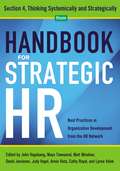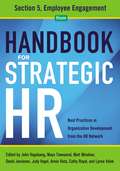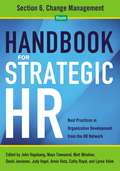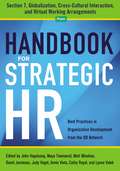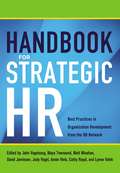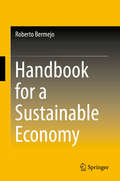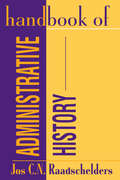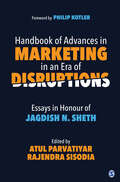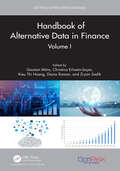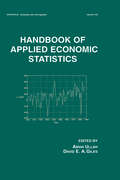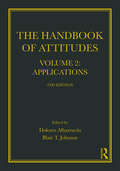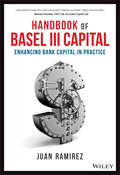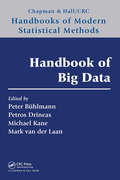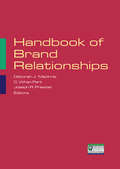- Table View
- List View
Handbook for Strategic HR - Section 4: Thinking Systematically and Strategically
by John Vogelsang Maya Townsend Matt Minahan David Jamieson Judy Vogel Annie Viets Cathy Royal Lynne Valek Od NetworkThinking systemically and strategically means moving beyond a focus on the individual to understand the larger organizational and environmental systems and how the dynamics of those systems impact work performance and the readiness for change. This section will explain how certain problems recur and are often made worse by quick solutions; how one decision can impact many people and set in motion a situation that can create numerous unexpected outcomes for the organization; and how to decide where best to begin fostering change—with individuals, groups, departments, the organization (policies, practices, culture, etc.), or the external market/community relationship.
Handbook for Strategic HR - Section 5: Employee Engagement
by John Vogelsang Maya Townsend Matt Minahan David Jamieson Judy Vogel Annie Viets Cathy Royal Lynne Valek Od NetworkEmployee engagement makes a difference. HR professionals know this intuitively and so do leaders. They want employees to care about their work and actively engage with the job and the organization. But now we know that employee engagement is not just something that makes intuitive sense. It also reaps financial rewards. This section provides case studies, hard data about what is effective, and proven techniques for increasing employee engagement in the important work of the organization in order to boost productivity, quality, and commitment.
Handbook for Strategic HR - Section 6: Change Management
by John Vogelsang Maya Townsend Matt Minahan David Jamieson Judy Vogel Annie Viets Cathy Royal Lynne Valek Od NetworkThe pace of change is increasing and shows no signs of slowing down. This section brings you the best thinking from forty years of the OD Practitioner journal on:- The different kinds of change and what's needed to achieve each one.- What you must do to see change initiatives through to completion.- The enablers that must be in place for change to succeed.- Examining change from the change recipient’s point of view.- How to establish internal change agents who can help advocate for the change at ground-level.- Lessons on how to engage in change outside Western societies.- How to handle resistance to change.
Handbook for Strategic HR - Section 7: Globalization, Cross-Cultural Interaction, and Virtual Working Arrangements
by John Vogelsang Maya Townsend Matt Minahan David Jamieson Judy Vogel Annie Viets Cathy Royal Lynne Valek Od NetworkOrganizations are globalizing at a frenetic rate. The world is becoming more connected each year and each generation of technology speeds up this process. What once took weeks and then days to share now can be done in minutes. This section will help you understand the dynamics of culture and diverse values in a global environment; how to manage across both virtual and physical borders; and how to sustain the performance and engagement of multi-ethnic, multifaceted employees. Also included are important insights on working in a global office space; how to use technology; how to collaborate effectively in global organizations; and “lessons learned” about cross-cultural values and leadership.
Handbook for Strategic HR: Best Practices in Organization Development from the OD Network
by OD NetworkThis forward-thinking book introduces HR leaders to core organization development strategies and skills--providing creative approaches, practical tips, and proven methods to help them succeed.Since the 1990s, a transformation has occurred within the role of human resources departments. HR professionals are being called upon to help determine priorities in running the business, craft organizational development strategies, and shape the culture within their company.Through a compendium of the best thinking on the subject, you&’ll learn how to strategically: identify where best to foster change in the organization,team up with consultants and senior-level staff in leading a change project,improve employee engagement,include others in the important work of the organization,and operate effectively in cross-cultural and virtual working situations.Comprehensive and practical, Handbook for Strategic HR includes 78 articles that will enable you see the big picture roles and responsibilities of human resource professionals today. Best of all, this book is approved for HRCI Recertification Credit--helping you to advance your career in numerous tangible ways.
Handbook for a Sustainable Economy
by Roberto BermejoSince the 1992 World Scientists' Warning to Humanity, the looming prospect of Earth's changing climate has inspired a broad movement dedicated to a sustainable future. In this Handbook, the author explains the elements of a sustainable economy, the development of which must be undertaken if we are to retain our civilization. The first section offers a critical analysis of orthodox economical thinking, and the tools used by the conventional economy to solve the "environmental problem. " The author examines the theory and tools of Environmental Economics addressing the commodification of nature, and offers analysis of the theoretical and practical contradictions which arise from attempts to combine environmental protection and free trade. Part II discusses the principles and tools needed to build a sustainable economy, including the concept of biomimicry as a guiding principle of sustainability, a brief description of the adaptive cycle of ecosystems and explains the concept of transformability and the factors that determine it. Discussion includes a broad evaluation of the capacity for transformation of National Sustainable Development Strategies and an analysis of the essential requirements of ecology-based tax reform. Also included is a critical vision of the dominant paradigm of science and technology. The third section explores sustainable production and consumption, discussing energy, transport, the circular economy of materials and sustainable consumption. Included are a detailed analysis of factors that determine the limits of fossil fuels, a description of the peak oil structural effect and its sectoral impacts, an overview of a sustainable electric system and a review of biofuels, electricity and hydrogen. The author concludes that only hydrogen associated to fuel offers a sustainable alternative to oil. Discussion includes a view of the structural causes of the current high-level consumption model through the lens of motivation, provision and access systems and a detailed description of policies that must be adopted as part of a sustainable consumption strategy. The final chapter undertakes the task of analyzing the capability of our societies to transform themselves to reach sustainability. The author broadly evaluates each factor, as a prior step to carrying out an overall evaluation and demonstrates that in order to accomplish a comprehensive analysis, a multidisciplinary group is necessary.
Handbook in Monte Carlo Simulation
by Paolo BrandimarteAn accessible treatment of Monte Carlo methods, techniques, and applications in the field of finance and economicsProviding readers with an in-depth and comprehensive guide, the Handbook in Monte Carlo Simulation: Applications in Financial Engineering, Risk Management, and Economics presents a timely account of the applicationsof Monte Carlo methods in financial engineering and economics. Written by an international leading expert in thefield, the handbook illustrates the challenges confronting present-day financial practitioners and provides various applicationsof Monte Carlo techniques to answer these issues. The book is organized into five parts: introduction andmotivation; input analysis, modeling, and estimation; random variate and sample path generation; output analysisand variance reduction; and applications ranging from option pricing and risk management to optimization.The Handbook in Monte Carlo Simulation features:An introductory section for basic material on stochastic modeling and estimation aimed at readers who may need a summary or review of the essentialsCarefully crafted examples in order to spot potential pitfalls and drawbacks of each approachAn accessible treatment of advanced topics such as low-discrepancy sequences, stochastic optimization, dynamic programming, risk measures, and Markov chain Monte Carlo methodsNumerous pieces of R code used to illustrate fundamental ideas in concrete terms and encourage experimentationThe Handbook in Monte Carlo Simulation: Applications in Financial Engineering, Risk Management, and Economics is a complete reference for practitioners in the fields of finance, business, applied statistics, econometrics, and engineering, as well as a supplement for MBA and graduate-level courses on Monte Carlo methods and simulation.
Handbook of Administrative History
by Jos RaadscheldersPublic administration is commonly assumed to be a young discipline, rooted in law and political science, with little history of its own. Likewise, teaching and scholarship in this field is often career oriented and geared either toward the search for immediately usable knowledge or guidelines and prescriptions for the future. Although most administrative scientists would acknowledge that their field has a history, their time horizon is limited to the recent past. Raadschelders demonstrates that public administration has in fact a long-standing tradition, both in practice and in writing; administration has been an issue ever since human beings recognized the need to organize themselves in order to organize the environment in which they lived. This history, in turn, underlines the need for administrators to be aware of the importance and contemporary impact of past decisions and old traditions. In seeking to go beyond the usual problem-solving and future-oriented studies of public administration, this volume adds greatly to the cognitive richness of this field of research. Indeed, the search for theoretical generalizations will profit from an approach that unravels long-term trends in the development of administration and government."Raadschelders approaches public administration history from a dual perspective, as trained historian and professor of public administration.... The volume is appropriately called a aehandbook' in view of its methodical listing of the literature on administrative history, together with summaries of numerous authors' principal theories. The second chapter is an essay on sources in the field, including an extended bibliography.... These parts of the book alone make it useful to scholars in the field.... Raadschelders is helpful in other ways as well. The third and fourth chapters offer a highly sophisticated discussion of methodological problems encountered in writing administrative history, including the issue of perceiving 'stage
Handbook of Advances in Marketing in an Era of Disruptions: Essays in Honour of Jagdish N. Sheth
by Atul Parvatiyar and Rajendra SisodiaWe are in an era of massive disruptions in markets, media, management approaches and business models. These disruptions are being caused by rapid technological changes on the one hand and tectonic shifts in customer preferences and societal behaviour on the other. Marketing knowledge and practices have to advance at a significantly higher pace to address the changing context of market behaviour. Handbook of Advances in Marketing in an Era of Disruptions is meant to share ideas and new knowledge that are relevant to this world of disruptions. Leading scholars from around the world, who have keenly observed the changing market environment, business policies, parameters, theories, methods and practices, have put forth their theses on how marketing thinking needs to evolve to keep pace with the market reality. This book is dedicated to Professor Jagdish N. Sheth and honours his sustained contribution as a management thinker, scholar, academician and corporate adviser in an illustrious career spanning over five decades.
Handbook of Agri-Food Law in China, Germany, European Union: Food Security, Food Safety, Sustainable Use of Resources in Agriculture
by Ines HärtelThis book offers a new and differentiated overview of Agri-Food Law against the background of national and global integration of markets, and compares for the first time important aspects of the agricultural, environmental and food law of China and Germany / the European Union. In addition to the basics, it discusses a wide range of issues, such as the respective legal regulatory structures for food security, food safety, geographical indications of origin, climate protection, fertilizers, plant protection products, genetic engineering, water protection, soil protection, land resources and organic farming. In addition, it addresses key environmental impacts and developments in order to create integrated value chains. The increasing fusion of upstream and downstream areas is becoming apparent from primary production, to the refinement and trade up level, and even to consumption. Agri-Food Law is now productively taking these important developments into account with regard to the aforementioned countries.
Handbook of Alternative Data in Finance, Volume I (CRC Press/OptiRisk Series in Finance)
by Gautam Mitra Christina Erlwein-Sayer Kieu Thi Hoang Diana Roman Zryan SadikHandbook of Alternative Data in Finance, Volume I motivates and challenges the reader to explore and apply Alternative Data in finance. The book provides a robust and in-depth overview of Alternative Data, including its definition, characteristics, difference from conventional data, categories of Alternative Data, Alternative Data providers, and more. The book also offers a rigorous and detailed exploration of process, application and delivery that should be practically useful to researchers and practitioners alike. Features Includes cutting edge applications in machine learning, fintech, and more Suitable for professional quantitative analysts, and as a resource for postgraduates and researchers in financial mathematics Features chapters from many leading researchers and practitioners
Handbook of Anti-Money Laundering
by Dennis CoxEffectively implement comprehensive anti-money laundering regulationsHandbook of Anti-Money Laundering details the most up-to-date regulations and provides practical guidance toward implementation. While most books focus on the regulations themselves, this useful guide goes further by explaining their meaning to bank operations, and how the rules apply to real-life scenarios. The international perspective provides a broader understanding of the anti-money laundering controls that are in place worldwide, with certain country-specific details discussed in-depth. Coverage includes the Wolfsberg Principles, Financial Action Task Force guidance, the U.S. Patriot Act, and the latest from both the EU and Bank for International Settlements.The IMF estimates that two to five per cent of the global GDP - $590 billion to $1.5 trillion - is laundered every year. Globally, banks and other financial institutions have been required to put in place specific arrangements to prevent and detect money laundering and the criminal activity that underlies it. This book provides the latest regulations and guidance toward application.Understand what money laundering regulations mean in practiceReference international and country-specific rules and regulationsGet up to speed on the most current regulations and practicesImplement the most effective anti-money laundering measuresIn response to the increased monitoring and regulation, money launderers have become more sophisticated at disguising the source of their funds. Financial institutions' employees must be ever more aware of what they're facing, and how to deal with it, making actionable guidance a critical companion to any regulatory information. For financial institutions seeking more thorough understanding and practical advice, the Handbook of Anti-Money Laundering is a comprehensive guide.
Handbook of Applied Economic Statistics (Statistics: A Series of Textbooks and Monographs)
by Aman Ullah David E. A. GilesThis work examines theoretical issues, as well as practical developments in statistical inference related to econometric models and analysis. This work offers discussions on such areas as the function of statistics in aggregation, income inequality, poverty, health, spatial econometrics, panel and survey data, bootstrapping and time series.
Handbook of Applied Teaching and Learning in Social Work Management Education: Theories, Methods, and Practices in Higher Education
by Maik ArnoldThis up-to-date reference work explores theories, methods and practices of social work management education in higher education. It includes contributions from more than 30 scholars and researchers in the field of social work management education from more than 10 countries and 4 continents.The work is unique as it overcomes current barriers between the different sub-disciplines of social work didactics and management education, and takes into consideration the development of a discipline-specific Scholarship of Teaching and Learning (SoTL). The integrated and transdisciplinary approach to social work management education presented in this edited volume is of paramount importance to international scholars, teachers, practitioners, students and all other audiences interested in the field of education. The work provides an overview of the theoretical principles on how social work management can be taught and learned, and analyzes curricula, pedagogical approaches, actors, and socio-economic and institutional contexts of social work management at higher education institutions
Handbook of Attitudes, Volume 2: 2nd Edition
by Dolores Albarracin Blair T. JohnsonAttitudes are evaluations of people, places, things, and ideas. They help us to navigate through a complex world. They provide guidance for decisions about which products to buy, how to travel to work, or where to go on vacation. They color our perceptions of others. Carefully crafted interventions can change attitudes and behavior. Yet attitudes, beliefs, and behavior are often formed and changed in casual social exchanges. The mere perception that other people—say, rich people— favor something may be sufficient to make another person favor it. People’s own actions also influence their attitudes, such that they adjust to be more supportive of the actions. People’s belief systems even change to align with and support their preferences, which at its extreme is a form of denial for which people lack awareness. These two volumes of The Handbook of Attitudes provide authoritative, critical surveys of theory and research about attitudes, beliefs, persuasion, and behavior from key authors in these areas. This second volume covers applications to measurement, behavior prediction, and interventions in the areas of cancer, HIV, substance use, diet, and exercise, as well as in politics, intergroup relations, aggression, migrations, advertising, accounting, education, and the environment.
Handbook of Basel III Capital - Enhancing Bank Capital in Practice
by Juan RamirezA deeper examination of Basel III for more effective capital enhancement The Handbook of Basel III Capital – Enhancing Bank Capital in Practice delves deep into the principles underpinning the capital dimension of Basel III to provide a more advanced understanding of real-world implementation. Going beyond the simple overview or model, this book merges theory with practice to help practitioners work more effectively within the regulatory framework, and utilise the complex rules to more effectively allocate and enhance capital. A European perspective covers the CRD IV directive and associated guidance, but practitioners across all jurisdictions will find value in the strategic approach to decisions surrounding business lines and assets; an emphasis on analysis urges banks to shed unattractive positions and channel capital toward opportunities that actually fit their risk and return profile. Real-world cases demonstrate successful capital initiatives as models for implementation, and in-depth guidance on Basel III rules equips practitioners to more effectively utilise this complex regulatory treatment. The specifics of Basel III implementation vary, but the underlying principles are effective around the world. This book expands upon existing guidance to provide a deeper working knowledge of Basel III utility, and the insight to use it effectively. Improve asset quality and risk and return profiles Adopt a strategic approach to capital allocation Compare Basel III implementation varies across jurisdictions Examine successful capital enhancement initiatives from around the world There is a popular misconception about Basel III being extremely conservative and a deterrent to investors seeking attractive returns. In reality, Basel III presents both the opportunity and a framework for banks to improve their assets and enhance overall capital – the key factor is a true, comprehensive understanding of the regulatory mechanisms. The Handbook of Basel III Capital – Enhancing Bank Capital in Practice provides advanced guidance for advanced practitioners, and real-world implementation insight.
Handbook of Big Data (Chapman & Hall/CRC Handbooks of Modern Statistical Methods)
by Michael Kane Peter Bühlmann Petros Drineas Mark van der LaanHandbook of Big Data provides a state-of-the-art overview of the analysis of large-scale datasets. Featuring contributions from well-known experts in statistics and computer science, this handbook presents a carefully curated collection of techniques from both industry and academia. Thus, the text instills a working understanding of key statistical
Handbook of Big Data and Analytics in Accounting and Auditing
by Tarek Rana Jan Svanberg Peter Öhman Alan Lowe<p>This handbook collects the most up-to-date scholarship, knowledge, and new developments of big data and data analytics by bringing together many strands of contextual and disciplinary research. In recent times, while there has been considerable research in exploring the role of big data, data analytics, and textual analytics in accounting, and auditing, we still lack evidence on what kinds of best practices academics, practitioners, and organizations can implement and use.<p> <p>To achieve this aim, the handbook focuses on both conventional and contemporary issues facing by academics, practitioners, and organizations particularly when technology and business environments are changing faster than ever. All the chapters in this handbook provide both retrospective and contemporary views and commentaries by leading and knowledgeable scholars in the field, who offer unique insights on the changing role of accounting and auditing in today’s data and analytics driven environment.<p>
Handbook of Big Geospatial Data
by Martin Werner Yao-Yi ChiangThis handbook covers a wide range of topics related to the collection, processing, analysis, and use of geospatial data in their various forms. This handbook provides an overview of how spatial computing technologies for big data can be organized and implemented to solve real-world problems. Diverse subdomains ranging from indoor mapping and navigation over trajectory computing to earth observation from space, are also present in this handbook. It combines fundamental contributions focusing on spatio-textual analysis, uncertain databases, and spatial statistics with application examples such as road network detection or colocation detection using GPUs. In summary, this handbook gives an essential introduction and overview of the rich field of spatial information science and big geospatial data. It introduces three different perspectives, which together define the field of big geospatial data: a societal, governmental, and governance perspective. It discusses questions of how the acquisition, distribution and exploitation of big geospatial data must be organized both on the scale of companies and countries. A second perspective is a theory-oriented set of contributions on arbitrary spatial data with contributions introducing into the exciting field of spatial statistics or into uncertain databases. A third perspective is taking a very practical perspective to big geospatial data, ranging from chapters that describe how big geospatial data infrastructures can be implemented and how specific applications can be implemented on top of big geospatial data. This would include for example, research in historic map data, road network extraction, damage estimation from remote sensing imagery, or the analysis of spatio-textual collections and social media. This multi-disciplinary approach makes the book unique.This handbook can be used as a reference for undergraduate students, graduate students and researchers focused on big geospatial data. Professionals can use this book, as well as practitioners facing big collections of geospatial data.
Handbook of Bioenergy Economics and Policy
by David Zilberman Madhu Khanna Jürgen ScheffranConcerns about energy security, uncertainty about oil prices, declining oil reserves, and global climate change are fueling a shift towards bioenergy as a renewable alternative to fossil fuels. Public policies and private investments around the globe are aiming to increase local capacity to produce biofuels. A key constraint to the expansion of biofuel production is the limited amount of land available to meet the needs for fuel, feed, and food in the coming decades. Large-scale biofuel production raises concerns about food versus fuel tradeoffs, about demands for natural resources such as water, and about potential impacts on environmental quality. The book is organized into five parts. The introductory part provides a context for the emerging economic and policy challenges related to bioenergy and the motivations for biofuels as an energy source. The second part of the handbook includes chapters that examine the implications of expanded production of first generation biofuels for the allocation of land between food and fuel and for food/feed prices and trade in biofuels as well as the potential for technology improvements to mitigate the food vs. fuel competition for land. Chapters in the third part examine the infrastructural and logistical challenges posed by large scale biofuel production and the factors that will influence the location of biorefineries and the mix of feedstocks they use. The fourth part includes chapters that examine the environmental implications of biofuels, their implications for the design of policies and the unintended environmental consequences of existing biofuel policies. The final part presents economic analysis of the market, social welfare, and distributional effects of biofuel policies.
Handbook of Bioenergy Economics and Policy: Volume II
by David Zilberman Madhu KhannaIn its second volume, this book aims to link the academic research with development in the real world and provide a historical and institutional background that can enrich more formal research. The first section will include an assessment of the evolution and the state of the nascent second-generation biofuel as well as a perspective on the evolution of corn ethanol and sugarcane ethanol in Brazil. It will also include a historical and institutional background on the biofuel industry in Brazil that has global lessons, and later, provide a technical overview of major analytical tools used to assess the economic, land use and greenhouse gas implications of biofuel policies at a regional and global level. Additionally, the book analyzes the various drivers for land use change both at a micro-economic level and at a macro-economic level. It presents studies that apply regional and global economic models to examine the effects of biofuel policies in the US, EU and Brazil on regional and global land use, on food and fuel prices and greenhouse gas emissions. These papers illustrate the use of partial and general equilibrium modeling approaches to simulate the effects of various biofuel policies, and includes studies showing the effects of risk aversion, time preferences and liquidity constraints on farmers decision to grow energy crops for biofuel production. By presenting the tools of lifecycle analysis for assessing the direct greenhouse gas intensity of biofuels, this handbook investigates the types of indirect or market mediated effects that can offset or strengthen these direct effects. It will include tools to assess the direct and indirect effects of biofuel production on greenhouse gas emissions in the US and Brazil, and ultimately provide a comprehensive background to understand the state of biofuel in the present and how to analyze their implication.
Handbook of Bioentrepreneurship
by Holger Patzelt Thomas BrennerProviding an important and timely overview of research on the exciting area of entrepreneurship in biotechnology, The Handbook of Bioentrepreneurship examines one of the most promising industries of the 21st century. While genetically engineered food and biopharmaceuticals have made biotechnology part of our everyday life, starting a bioventure is among the most complex and risky entrepreneurial tasks given long development cycles, high technological and market uncertainty, and high capital intensity. Providing unparalleled in-depth and detailed analysis, this Handbook sheds light on business models and strategies, financing, cooperation networks between firms and universities, among other issues. With new developments in biotechnology increasingly in the news, this is an important source for readers interested in public policy, entrepreneurship, and business in the 21st century.
Handbook of Biorefinery Research and Technology: Biomass Logistics to Saccharification
by Virendra BisariaThis handbook provides a comprehensive review of the latest scientific developments through authoritative, expertly validated overviews in this field. It covers the basic principles, upfront research accomplishments as well as successful industrial applications. Each chapter is written by a domain expert which besides the in-depth review of the topic also outlines an economic outlook and future directions of research of the area. The book is structured in a way that is appropriate for advanced graduate students and professionals in diverse scientific and engineering communities including biocatalysis, genetic engineering, metabolic engineering, and bioprocess technology.
Handbook of Biorefinery Research and Technology: Production of Biofuels and Biochemicals
by Virendra BisariaThis handbook provides a comprehensive review of the latest scientific developments through authoritative, expertly validated overviews in this field. It covers the basic principles, upfront research accomplishments as well as successful industrial applications. Each chapter is written by a domain expert which besides the in-depth review of the topic also outlines an economic outlook and future directions of research of the area. The book is structured in a way that is appropriate for advanced graduate students and professionals in diverse scientific and engineering communities including biocatalysis, genetic engineering, metabolic engineering, and bioprocess technology.
Handbook of Brand Relationships
by C. Whan Park Deborah J. MacInnis Joseph W. PriesterBrand relationships are critical because they can enhance company profitability by lowering customer acquisition and retention costs. This is the first serious academic book to offer a psychological perspective on the meaning of and basis for brand relationships, as well as their effects. "The Handbook of Brand Relationships" includes chapters by well-known marketing and psychology scholars on topics related to the meaning, significance, and measurement of brand relationships; the critical connections between consumers and the brand; how brand relationships are formed through both thoughtful and non-thoughtful processes; and how they are built, repaired, and leveraged through brand extensions. An integrative framework introduces the book and summarizes the chapters' key ideas. The handbook also identifies several novel metrics for measuring various aspects of brand relationships, and it includes recommendations for further research.
